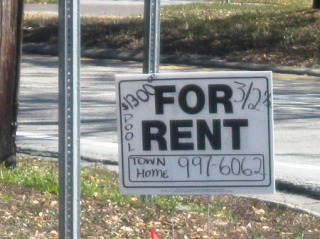|
Article Courtesy of The St. Petersburg Times By Marlene Sokol Published March 14, 2010 Again and again, Brian Sudak complained about the succession of renters next door. There was drug dealing. "We've had undercover narcotics agents on our porch," he said. There was the family that vanished in the middle of the night. Years back, there was a manhunt and a police helicopter. "We've lived in New York for most of our lives, and I never saw the need to buy a gun," Sudak said.
homeowners association considered a number of alternatives, including a policy that would make an exception for military families. The issue is not a simple one, association attorney Robert Tankel said. A liberal policy toward rentals can increase a property's value, especially in a resort-type area, he said. Limiting them can backfire if the properties wind up in foreclosure. "There is no one-size-fits-all, or even a one-size-fits-most (solution)," Tankel said. A way of life Heritage Isles, in the heart of New Tampa, has always been known as a diverse, middle-income community. It has a golf course but struggles to support it. Townhouse prices have dipped below $100,000. And, almost since the community was developed in the late 1990s, there have been large numbers of renters.
become more and more exposed, literally," referring to landscaping that falls below Cheval standards. His board is trying to improve, not restrict, the renting process by reminding owners of their responsibilities. They have to, McClain said, because even Cheval has owners who cannot afford to stay and cannot afford to sell. "Instead of losing their home, they might be able to generate enough income to keep it," McClain said. In Lithia's FishHawk Ranch, Realtors Garth Jones and Heather Jenkins are turning rentals into a side business. They manage five rental homes in FishHawk and would like to handle as many as 50. Advertising on the Internet as "Rent in FishHawk," they are reaching out to owners who don't want to sell now and residents who have either outgrown the family-oriented community or don't want a long-term commitment. "I've had several people tell me that their kids graduated high school, they want to downsize, and they don't want to sell in this market," Jenkins said. "People want to live there. Obviously, the schools are good. There are things for kids to do, activities for the family." A matter of quality Rental managers are sometimes defensive about their role in a community. Typically, they say, they run their renters through background checks that are far more scrupulous than anything required of a homeowner. "It's all dependent on your price point," said Rhonda Nappi, who manages several homes in Panther Trace. Outside the neighborhood, she has had properties that fetched as little as $400. "When they're paying $950 and up, you get a different type of people," she said. Rules hard to change Tempting as it might be to discourage renting, it isn't easy to amend a homeowners association's governing rules. Doing so typically requires a majority vote among homeowners, including the investor-owners who want to keep renting. What's more, Tankel said, it is important to make sure the ban does not apply to the association itself. If the board neglects to take that step, he said, "then they can't rent the units that they foreclosed on." Sudak said there was a strong showing at the January meeting in Panther Trace, where the amendment about renters was defeated. He has mixed feelings about the way things turned out. "I like the fact that it got people involved," he said. Rather than a ban, he'd like to see the homeowners association get involved in screening renters and evict those who cause trouble. "My neighbor on the other side is a renter and he has lived here as long as I have," Sudak said. "I don't want to see him leave." |

